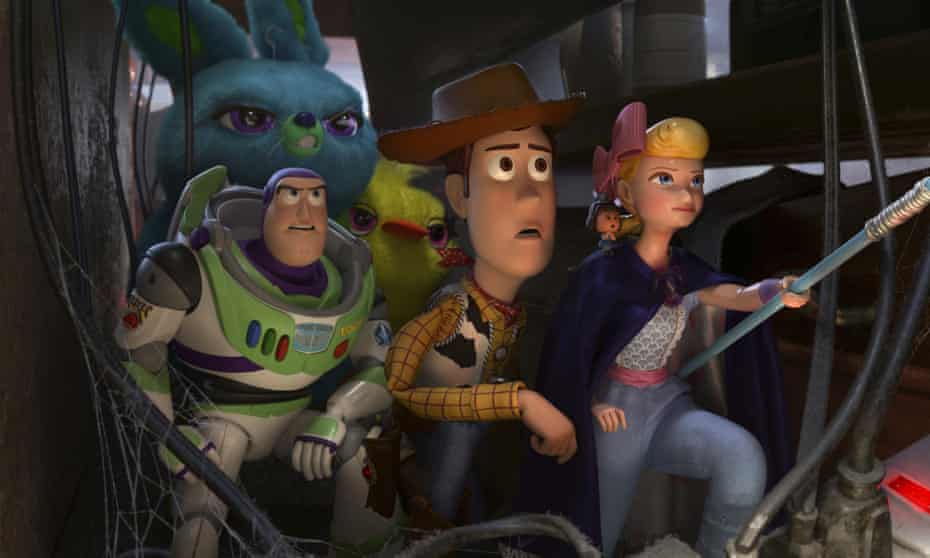Nero Christ
Sniper out now on all digital platforms brev
Lightyear is the latest example of a studio milking a past glory, and maybe film fans are growing tired of it

Buzz Lightyear, Woody and Bo Peep in Toy Story 4: ‘Lightyear is just another variation on a character we are familiar with, and catchphrases we’ve heard before.’ Photograph: Pixar/AP
The trailer for Pixar’s upcoming film Lightyear debuted last week, and met an unexpectedly muted response from film fans. It promises to be a fun, child-friendly animated space adventure with Chris Evans leading the voice cast, which should have delighted the faithful. But it centres on a character called Buzz Lightyear, derived from its Toy Story series, and appears to be yet another case of a film studio giving an unnecessary backstory to a character who arrived onscreen fully formed.
For decades, fans and critics complained about Hollywood’s endless sequels, which eventually run out of steam by either ratcheting up the action to ludicrous heights or losing sight of what made their heroes interesting in the first place. Instead, to keep those same franchises alive, studios responded by pivoting to reboots, prequels and origin stories. These initially seemed more fruitful – a fun flashback origin opens Indiana Jones and the Last Crusade, with River Phoenix’s young Indy gaining all his character tics in a single eventful afternoon – but now we have an endless parade of such flashbacks masquerading as standalone films.
Han Solo, Cruella de Vil, the wizard of The Wizard Of Oz, Freddy Krueger, Jason Voorhees: they’ve all had unnecessary origin stories. And all of their films share the same basic problem as the sequels: studio executives only seem to feel safe when they’re greenlighting films based on popular existing franchises, and that is self-defeating.
The problem is not that Hollywood is out of ideas or original characters; we have a more diverse and daring crop of film-makers than at any time in film history. The issue is timid studios that prefer endless rehashes of the same characters because no one ever got fired for saying yes to a sequel or prequel. If your star gets too established and expensive, make an origin story and replace Johnny Depp with the younger, cheaper Timothée Chalamet, such as in the new Wonka film.
If there’s a time when you can’t quite decide where to go with your Batman or Spider-Man series, write an origin story for their villains, and spin off Joker and Venom. Those two films also appealed to an older audience than the franchises that birthed them, but origin stories can go the other way too: the forthcoming Minions: The Rise of Gru takes a younger, cutesier approach to the protagonist of Despicable Me, presumably hoping that the latest crop of preschoolers will discover that franchise. And as with Joker and Venom, any notable villain is now fair game for their own origin-story prequel, taking a sympathetic view of their passage to the dark side: consider Maleficent, Cruella or the entire Star Wars prequel trilogy.
The origin-story prequel has become a popular – with studios – way of reinvigorating dead or aged-out characters over and over. They’re not all bad, but the drama of prequels is inherently limited. We know that the hero of Solo: A Star Wars Story will survive his adventure; we also know he’ll make friends with a Wookiee and get a ship called the Millennium Falcon. But worse than that, none of this backstory adds much to his character. Han Solo arrived onscreen perfectly formed. We didn’t know what the Kessel run was; we just knew that the guy who did it in “less than 12 parsecs” was the coolest man alive. Learning that Darth Vader was once a sad little blond boy, or that Hannibal Lecter was scarred by the second world war only detracted from their effectiveness. It’s a rare prequel that adds useful context to an indelible character without stealing their mystique: The Godfather Part II is, if anything, the exception that proves the rule.
The best we can hope for is a prequel with a clever twist: 2009’s Star Trek film created a parallel timeline to the original TV series, allowing it to go off in a new direction without being locked into what had gone before. The Marvel Cinematic Universe’s overarching narrative has allowed that studio to launch new heroes and reboot elements of its story through time travel or multi-verse stuff without resorting to many outright origin stories or reboots – so far.
At least Lightyear, technically, is not a prequel, even if it has all the hallmarks of one. It’s the story of the fictional character that inspired the Buzz Lightyear toy we know. This is the Toy Story universe’s equivalent of Buck Rogers or Flash Gordon, someone Buzz’s owner Andy would have watched on TV. That could offer some laughs and potentially a fun contrast to the studio’s all-conquering toys – but it’s still just another variation on a character we are familiar with, and catchphrases we’ve heard before.
Pixar is far from the worst offender in this respect – Lightyear will follow recent original stories Luca, Soul and Onward – but this is essentially a fifth Toy Story feature, not counting short films, from a studio with greater potential for original storytelling than any other on Earth. Where are the great new characters and stories going to come from if we keep dipping into past triumphs for every film with a budget over $5m? If we only recycle the characters we already know we like, pop culture will finally eat itself.
Enough with the origin stories. Film-making has become too risk-averse | Helen O'Hara
your thoughts?